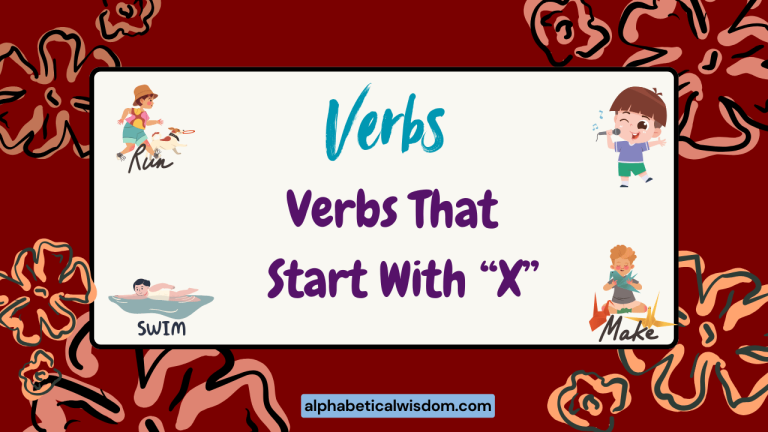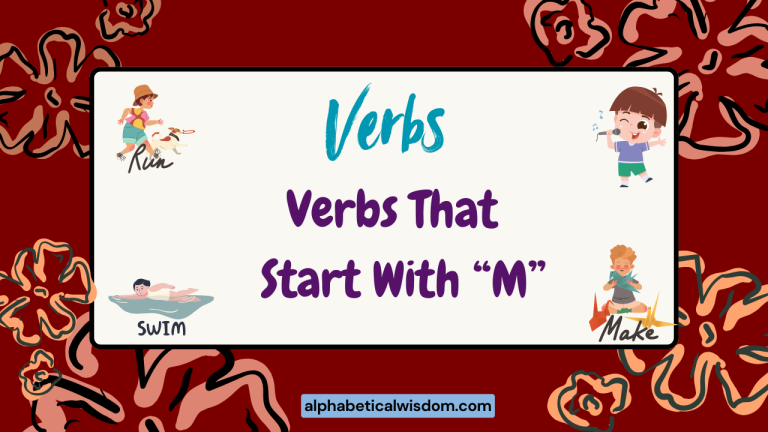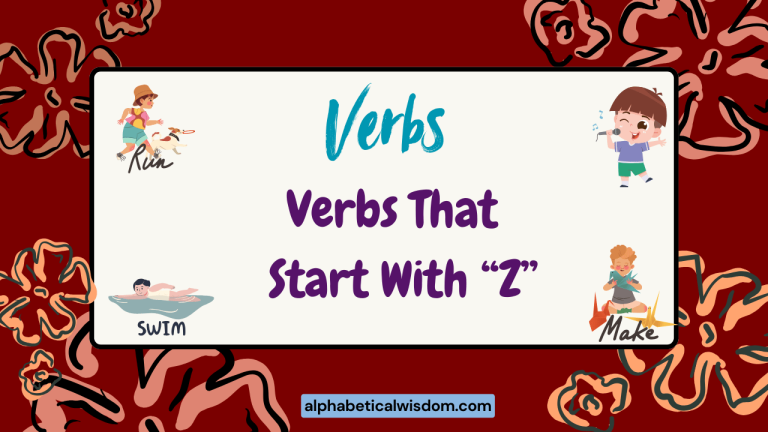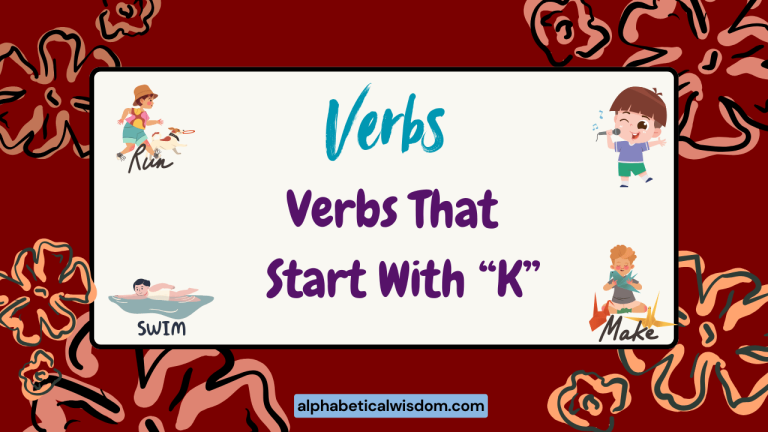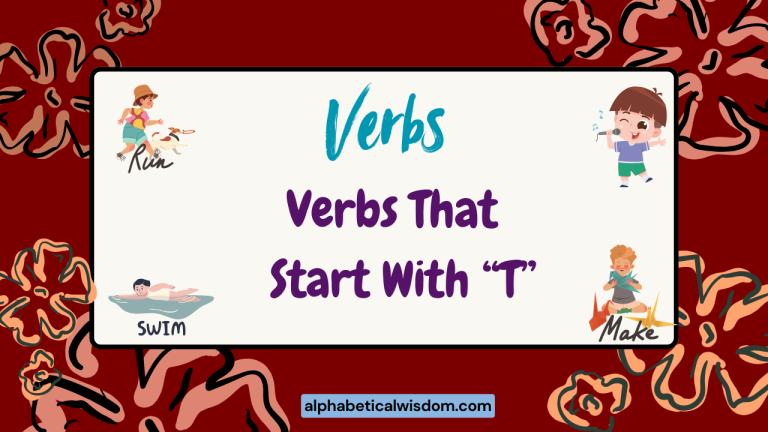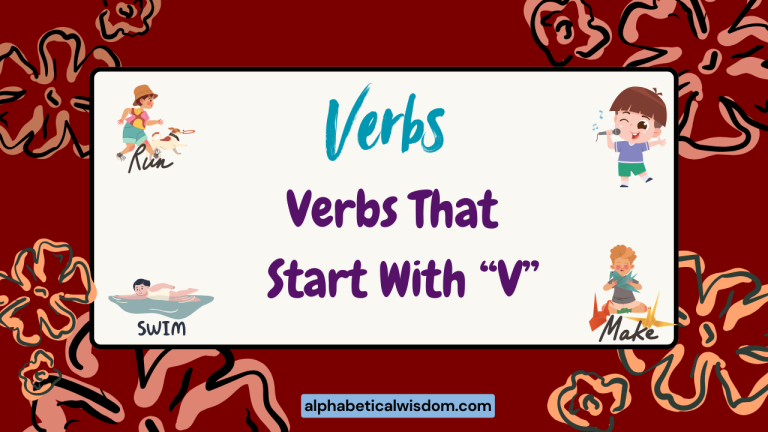Verbs Starting with C: A Comprehensive Grammar Guide
Mastering verbs is crucial for constructing grammatically correct and meaningful sentences in English. Verbs that begin with ‘C’ are particularly diverse, covering a wide range of actions, states, and occurrences.
This guide provides a detailed exploration of these verbs, offering definitions, examples, usage rules, and practice exercises. Whether you’re a beginner or an advanced learner, this comprehensive resource will enhance your understanding and application of verbs starting with ‘C’.
This knowledge is beneficial for academic writing, professional communication, and everyday conversations.
Table of Contents
- Introduction
- Definition of Verbs Starting with ‘C’
- Structural Breakdown
- Types and Categories of Verbs Starting with ‘C’
- Examples of Verbs Starting with ‘C’
- Usage Rules
- Common Mistakes
- Practice Exercises
- Advanced Topics
- FAQ
- Conclusion
Definition of Verbs Starting with ‘C’
Verbs starting with the letter ‘C’ encompass a broad spectrum of actions, processes, and states. A verb is a word that describes an action, occurrence, or state of being.
Verbs are the dynamic elements of sentences, indicating what the subject is doing or experiencing. Verbs that begin with ‘C’ are no different; they function in the same way.
These verbs can be classified into action verbs, linking verbs, and auxiliary verbs, each serving a distinct grammatical purpose.
The function of verbs starting with ‘C’ is to convey specific meanings related to actions, conditions, or helping other verbs. Understanding the nuances of these verbs is essential for precise and effective communication.
The context in which these verbs are used determines their specific meaning and grammatical role. Correct verb usage ensures clarity and coherence in both spoken and written English.
Structural Breakdown
The structure of verbs starting with ‘C’ follows the general patterns of English verbs. They can be conjugated into various tenses, aspects, and moods to express different time frames and conditions.
For example, the verb “call” can be conjugated as “called,” “calling,” “will call,” and so on. Understanding these conjugations is crucial for constructing grammatically correct sentences.
Regular verbs like “clean” follow predictable patterns, while irregular verbs like “catch” have unique forms that must be memorized.
Verbs starting with ‘C’ can also appear in different forms, such as the base form (e.g., call), the past tense form (e.g., called), the past participle form (e.g., called), and the present participle form (e.g., calling). These forms are used in different grammatical constructions, such as simple tenses, perfect tenses, and continuous tenses.
The structure of a sentence often dictates the form of the verb that is used.
Types and Categories of Verbs Starting with ‘C’
Verbs starting with ‘C’ can be categorized into several types, each with its own function and characteristics.
Action Verbs
Action verbs describe physical or mental actions. They indicate what the subject of the sentence is doing.
Examples include “climb,” “cook,” “create,” and “calculate.” These verbs are often transitive, meaning they take a direct object, or intransitive, meaning they do not.
Linking Verbs
Linking verbs connect the subject of the sentence to a noun or adjective that describes or identifies the subject. While verbs starting with ‘C’ aren’t commonly used as linking verbs, some can function as such in specific contexts.
“Continue” can sometimes act as a linking verb, depending on the sentence structure.
Auxiliary Verbs
Auxiliary verbs, also known as helping verbs, assist the main verb in a sentence. They provide information about tense, mood, or voice.
While ‘C’ verbs aren’t typical auxiliary verbs, understanding this category helps differentiate them from other verb types.
Examples of Verbs Starting with ‘C’
Here are some examples of verbs starting with ‘C’, categorized by their type.
Action Verb Examples
The table below provides a variety of action verbs starting with ‘C’ along with example sentences to illustrate their usage. Each sentence demonstrates how the verb functions to describe an action performed by the subject.
| Verb | Example Sentence |
|---|---|
| Call | I will call you later tonight. |
| Carry | She can carry the heavy boxes. |
| Catch | He tried to catch the ball. |
| Celebrate | We will celebrate her birthday tomorrow. |
| Change | You need to change your clothes. |
| Charge | The phone will charge overnight. |
| Chase | The dog likes to chase squirrels. |
| Cheat | Never cheat on a test. |
| Check | Please check your email regularly. |
| Chew | You should chew your food thoroughly. |
| Choose | You must choose between these options. |
| Chop | He will chop the vegetables for the salad. |
| Claim | They claim to have seen a UFO. |
| Clap | The audience clap after the performance. |
| Clean | We need to clean the house this weekend. |
| Clear | They will clear the table after dinner. |
| Climb | She wants to climb Mount Everest. |
| Close | Please close the door when you leave. |
| Collect | He likes to collect stamps. |
| Combine | You should combine the ingredients carefully. |
| Come | Please come to the party. |
| Command | The general command the troops to advance. |
| Communicate | It’s important to communicate effectively. |
| Compare | You can compare the two products. |
| Compete | They will compete in the race. |
| Complain | People often complain about the weather. |
| Complete | She needs to complete the project. |
| Compose | He will compose a song for her. |
| Compute | The computer can compute complex calculations. |
Linking Verb Examples
While less common, some verbs starting with ‘C’ can function as linking verbs, connecting the subject to a descriptive word or phrase. The following table demonstrates instances where ‘C’ verbs act as linking verbs, emphasizing their role in describing the subject’s state or condition.
| Verb | Example Sentence |
|---|---|
| Continue | The weather continued cold throughout the week. |
| Consider | I consider him a good friend. |
Auxiliary Verb Examples
Verbs starting with ‘C’ are not typically used as auxiliary verbs. However, understanding the concept of auxiliary verbs is important to distinguish them from action and linking verbs.
Auxiliary verbs help the main verb express tense, mood, or voice. Examples of common auxiliary verbs include “can,” “could,” and “have” (though these don’t start with ‘C’).
The following table provides example sentences using common auxiliary verbs to illustrate their function. Although these examples do not feature verbs starting with ‘C’, they clarify the role of auxiliary verbs in sentence construction.
| Auxiliary Verb | Example Sentence |
|---|---|
| Can | I can swim very well. |
| Could | She could play the piano when she was younger. |
| Have | They have finished their homework. |
Usage Rules
Verbs starting with ‘C’ follow the standard rules of English verb conjugation. They must agree with the subject in number and person.
For example, “I call,” but “He calls.” Regular verbs form their past tense and past participle by adding “-ed,” while irregular verbs have unique forms that must be memorized.
Tense consistency is also crucial. Use the appropriate tense to indicate when the action occurred.
For example, “I called yesterday” (past tense) versus “I will call tomorrow” (future tense). Pay attention to the context and ensure that the verb tense accurately reflects the timing of the action.
When using verbs in compound tenses (e.g., present perfect, past perfect), ensure that you use the correct auxiliary verbs. For example, “I have called” (present perfect) versus “I had called” (past perfect).
Understanding how auxiliary verbs combine with main verbs is essential for correct tense usage.
With verbs followed by gerunds or infinitives, certain verbs starting with ‘C’ require specific forms. For example, “continue doing” (gerund) versus “choose to do” (infinitive).
Knowing these patterns will help you avoid grammatical errors.
Common Mistakes
One common mistake is incorrect verb conjugation. For example, saying “He call” instead of “He calls.” This error violates subject-verb agreement.
Another common mistake is using the wrong tense. For example, saying “I will called” instead of “I will call.”
Confusing similar-sounding verbs is another frequent error. For example, using “chose” (past tense of “choose”) instead of “choose” (present tense).
Pay close attention to the context and meaning of the sentence to select the correct verb form.
The following examples illustrate some common mistakes and their corrections:
| Incorrect | Correct |
|---|---|
| He call me every day. | He calls me every day. |
| I will called you tomorrow. | I will call you tomorrow. |
| She choose the blue dress yesterday. | She chose the blue dress yesterday. |
| They claim that they are innocent, but the evidence is against they. | They claim that they are innocent, but the evidence is against them. |
Practice Exercises
Test your understanding of verbs starting with ‘C’ with the following exercises. Fill in the blanks with the correct form of the verb provided in parentheses.
Exercise 1: Verb Conjugation
| Question | Answer |
|---|---|
| 1. I ________ (call) you later. | will call |
| 2. She ________ (carry) the books to class. | carries |
| 3. He ________ (catch) the bus every morning. | catches |
| 4. They ________ (celebrate) their anniversary next week. | will celebrate |
| 5. You need to ________ (change) your attitude. | change |
| 6. The phone ________ (charge) quickly. | charges |
| 7. The dog ________ (chase) the cat around the yard. | chases |
| 8. Never ________ (cheat) on your taxes. | cheat |
| 9. Please ________ (check) your work before submitting it. | check |
| 10. You should ________ (chew) your food slowly. | chew |
Exercise 2: Sentence Completion
| Question | Answer |
|---|---|
| 1. We ________ to go to the beach this weekend. (choose) | chose |
| 2. He ________ the vegetables for soup. (chop) | chopped |
| 3. They ________ to have seen a ghost. (claim) | claim |
| 4. The audience ________ after the performance. (clap) | clapped |
| 5. We need to ________ the kitchen. (clean) | clean |
| 6. They will ________ the road after the storm. (clear) | clear |
| 7. She wants to ________ Mount Everest. (climb) | climb |
| 8. Please ________ the door on your way out. (close) | close |
| 9. He likes to ________ stamps. (collect) | collect |
| 10. You should ________ the ingredients thoroughly. (combine) | combine |
Exercise 3: Error Correction
| Question | Answer |
|---|---|
| 1. He call me every day. (Correct the verb) | He calls me every day. |
| 2. I will called you tomorrow. (Correct the verb) | I will call you tomorrow. |
| 3. She choose the blue dress yesterday. (Correct the verb) | She chose the blue dress yesterday. |
| 4. They are celebrate their anniversary next week. (Correct the verb) | They are celebrating their anniversary next week. |
| 5. He is chase the cat. (Correct the verb) | He is chasing the cat. |
| 6. She claim to be the winner. (Correct the verb) | She claims to be the winner. |
| 7. They clean the house every weekend. (Correct the verb) | They clean the house every weekend. |
| 8. I am close the window. (Correct the verb) | I am closing the window. |
| 9. He collect coins as a hobby. (Correct the verb) | He collects coins as a hobby. |
| 10. We will combine the ingredients now. (Correct the verb) | We will combine the ingredients now. |
Advanced Topics
For advanced learners, exploring the nuances of phrasal verbs starting with ‘C’ can be beneficial. Phrasal verbs combine a verb with a preposition or adverb, creating a new meaning.
For example, “call off” means to cancel, and “carry on” means to continue. Understanding these idiomatic expressions can significantly enhance your fluency.
Another advanced topic is the use of verbs starting with ‘C’ in complex sentence structures. These verbs can be used in subordinate clauses, relative clauses, and other advanced constructions.
Mastering these structures will allow you to express more complex ideas with greater precision.
Furthermore, delving into the etymology of verbs starting with ‘C’ can provide a deeper understanding of their meanings and origins. This knowledge can help you appreciate the richness and complexity of the English language.
Understanding the history of these words can help with memorization and usage.
FAQ
Here are some frequently asked questions about verbs starting with ‘C’.
- What is the difference between “choose” and “chose”?
“Choose” is the present tense form of the verb, while “chose” is the past tense form. For example, “I choose this one” (present) and “I chose that one yesterday” (past).
- How do I know if a verb starting with ‘C’ is transitive or intransitive?
A transitive verb takes a direct object, while an intransitive verb does not. For example, “I call him” (transitive) versus “I climb” (intransitive).
- Can verbs starting with ‘C’ be used in the passive voice?
Yes, many verbs starting with ‘C’ can be used in the passive voice. For example, “The door was closed by him.”
- What are some common phrasal verbs starting with ‘C’?
Some common phrasal verbs include “call off,” “carry on,” and “catch up.” Each of these has a unique meaning that differs from the individual words.
- How can I improve my verb conjugation skills?
Practice regularly, use online resources, and pay attention to verb usage in context. Consistent practice is key to mastering verb conjugation.
- Are there any irregular verbs starting with ‘C’?
Yes, “catch” is an irregular verb. Its past tense is “caught,” and its past participle is also “caught.”
- How do I use verbs starting with ‘C’ in different tenses?
Refer to grammar guides and practice exercises to learn the correct forms for each tense. Understanding the rules for each tense is essential for accurate verb usage.
- What is the role of auxiliary verbs with verbs starting with ‘C’?
Auxiliary verbs help to form different tenses, moods, and voices. For example, “I have called” (present perfect) uses “have” as an auxiliary verb.
- How do I avoid common mistakes with verbs starting with ‘C’?
Pay attention to subject-verb agreement, tense consistency, and verb forms. Reviewing common mistakes and practicing regularly will help you avoid errors.
- Can “continue” function as a linking verb?
Yes, in some cases, “continue” can function as a linking verb, connecting the subject to a descriptive word or phrase. For example, “The weather continued cold.”
- What are some strategies for memorizing the different forms of irregular verbs starting with ‘C’?
Use flashcards, practice exercises, and online resources to memorize the different forms. Repetition and consistent practice are key to memorization. Also, try to use these irregular verbs in sentences to reinforce your understanding.
Conclusion
Mastering verbs starting with ‘C’ is essential for effective communication in English. This guide has provided a comprehensive overview of these verbs, including their definitions, types, usage rules, and common mistakes.
By understanding these concepts and practicing regularly, you can significantly improve your grammar skills and fluency. Remember to pay attention to subject-verb agreement, tense consistency, and verb forms.
With consistent effort, you can confidently use verbs starting with ‘C’ in your writing and speaking.

